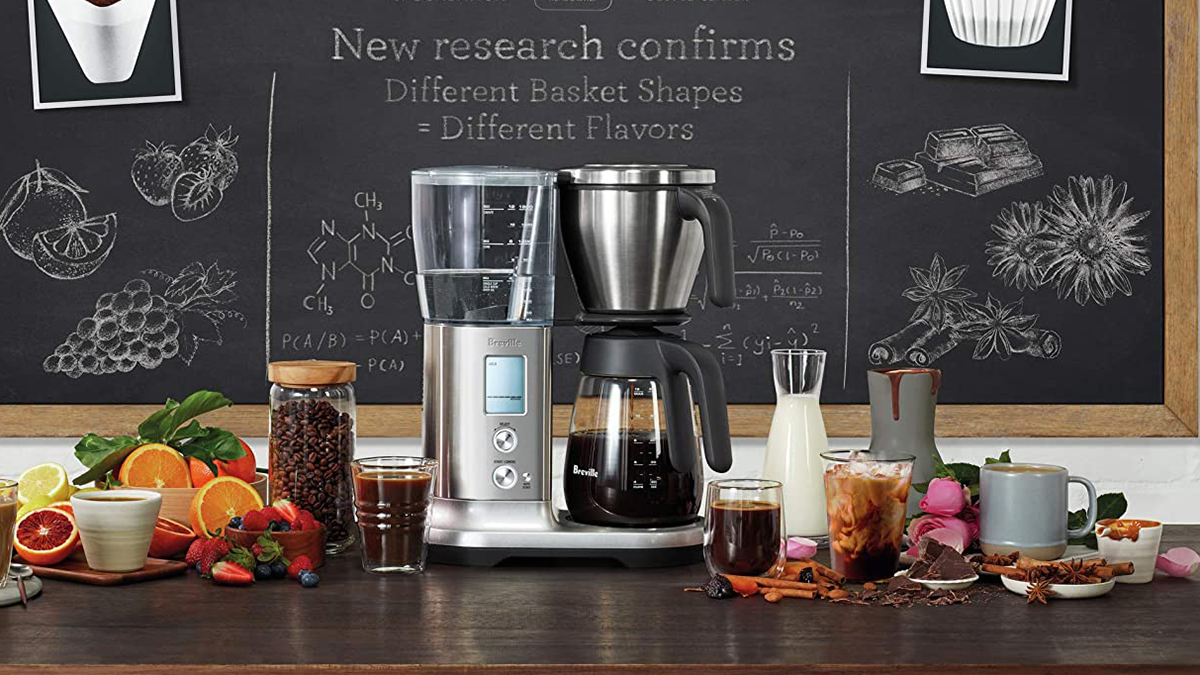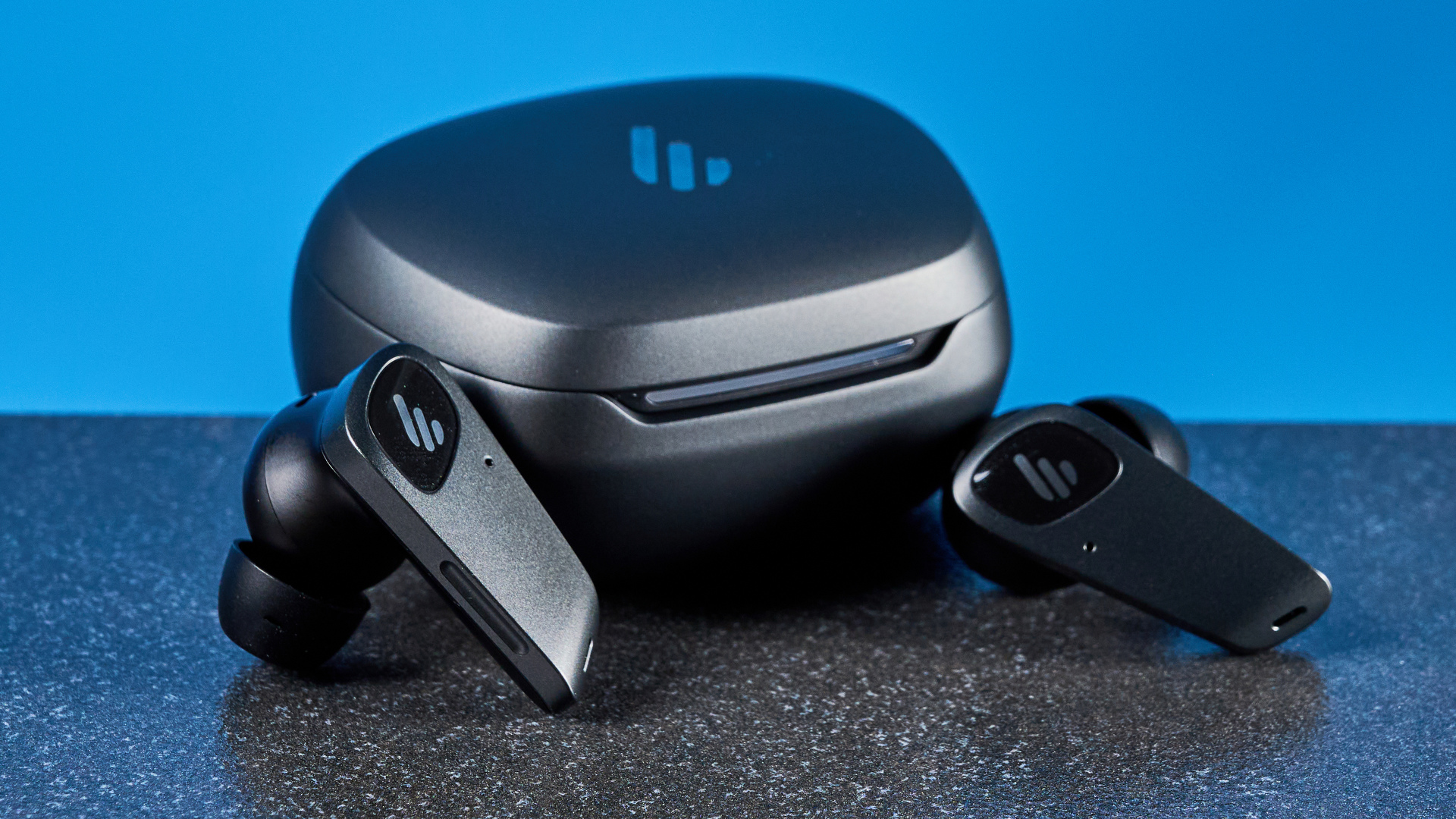Tom's Guide Verdict
The Breville Precision Brewer lives up to its name with an abundance of customizable features to help you achieve that ideal cup of coffee. This machine is designed for people who view coffee as a science; its appeal will be lost on casual drinkers who want something less complex and more affordable.
Pros
- +
Lots of customizable settings
- +
Produces Gold Cup-standard coffee
- +
Makes cold brew & iced coffee
Cons
- -
Makes too much noise
- -
Significant learning curve
- -
Expensive
Why you can trust Tom's Guide
The Breville Precision Brewer – also known as the Sage Precision Brewer outside of the US – is a coffee maker for the tinkerers. It includes a massive range of controls to help you find that perfect cup while also offering a number of presets that produce Gold Cup-standard coffee.
Due to its wealth of customizable features and sophisticated tech, this Breville coffee maker commands a high asking price. But surely a machine that promises to make the best cup of coffee 'regardless of its origin, age, or roast' is worth the cost, right? Well, that's where we come in.
We spent the last month thoroughly testing the Breville Precision Brewer with glass carafe. After many cups of coffee (prepared many different ways, mind you), we're here to share our thoughts on how this premium Breville brewer fares against the best coffee makers.
Cup capacity: 12 cups (60 oz)
Size: 12 x 7 x 16 inches
Filter: permanent and paper
Features: custom brew settings, auto start
Warranty: 2 years
Breville Precision Brewer: Price
The Breville Precision Brewer was released in October 2017 with an MSRP of $299.99. It's currently on sale at Amazon for $225 with a glass carafe or $240 with a thermal carafe. You can save a little extra by going for a stylish glass carafe, but a thermal option generally does a better job of keeping drinks warm.
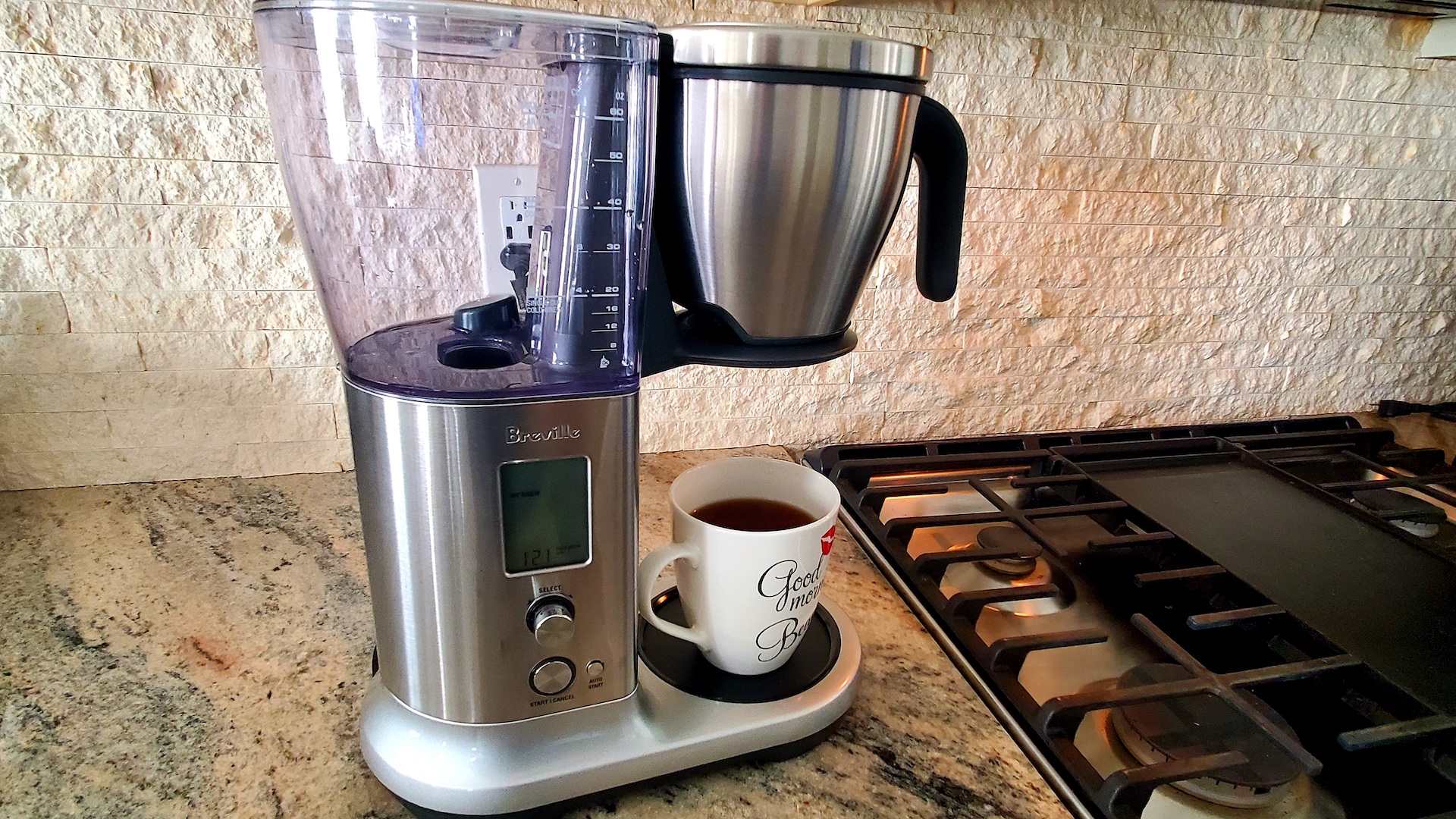
The Ninja Hot and Cold Brewed System costs the same as the Breville Precision Brewer. Unlike the Breville, the Ninja has a built-in frother, slightly easier controls, and the ability to make tea – but it lacks the customization features seen here.
The Breville Precision Brewer comes with a permanent mesh basket filter plus a 10-pack of flat-bottom paper basket filters for brewing at least 40-oz of coffee. Anything less than that volume will require a cone filter, which isn't included. If you only brew a couple of cups of coffee for yourself most mornings, you'll need to either purchase cone paper filters or find a compatible permanent filter for a more cost-efficient, environmentally-sound solution.
Breville Precision Brewer: Features
The Breville brewer has a maximum capacity of 60 oz, or 12 cups. It's also capable of single brews for cups or travel mugs up to 20 oz. This is good news if you're keen to give up the coffee pods, but if you're not ready to relinquish your K-Cups, the less expensive Cuisinart Coffee Center may be worth considering at $199.99.
There’s a lot of tech packed into the Breville Precision Brewer. Under the hood is a thermo-coil heating and pump system that allows for greater temperature control. Bloom time and water flow can also be adjusted to create the optimal cup of coffee that's suited to the beans you use.
Water is dispersed through a wide showerhead for even saturation of coffee grinds. If you typically brew single cups, you may want to opt for a more narrow pour over – but you'll have to purchase a pour over adapter separately.
For anyone who doesn't have the time nor desire to tinker with myriad settings each day, the Breville Precision Brewer includes five ready-made presets:
- Fast: Brews coffee as quickly as it can push water through the tank.
- Gold: Adjusts brewing time and temperature per SCA recommendations.
- Strong: Delivers a more robust and intense flavor.
- Over Ice: Produces a concentrated brew to be enjoyed over ice or chilled.
- Cold Brew: Steeps grinds in cold water for up to 24 hours for a smooth brew.
There's also the My Brew preset, which you'll have to adjust to your specifications. It enables you to customize the temperature, bloom time, flow rate, as well as select the pour over setting if you have the optional adapter.
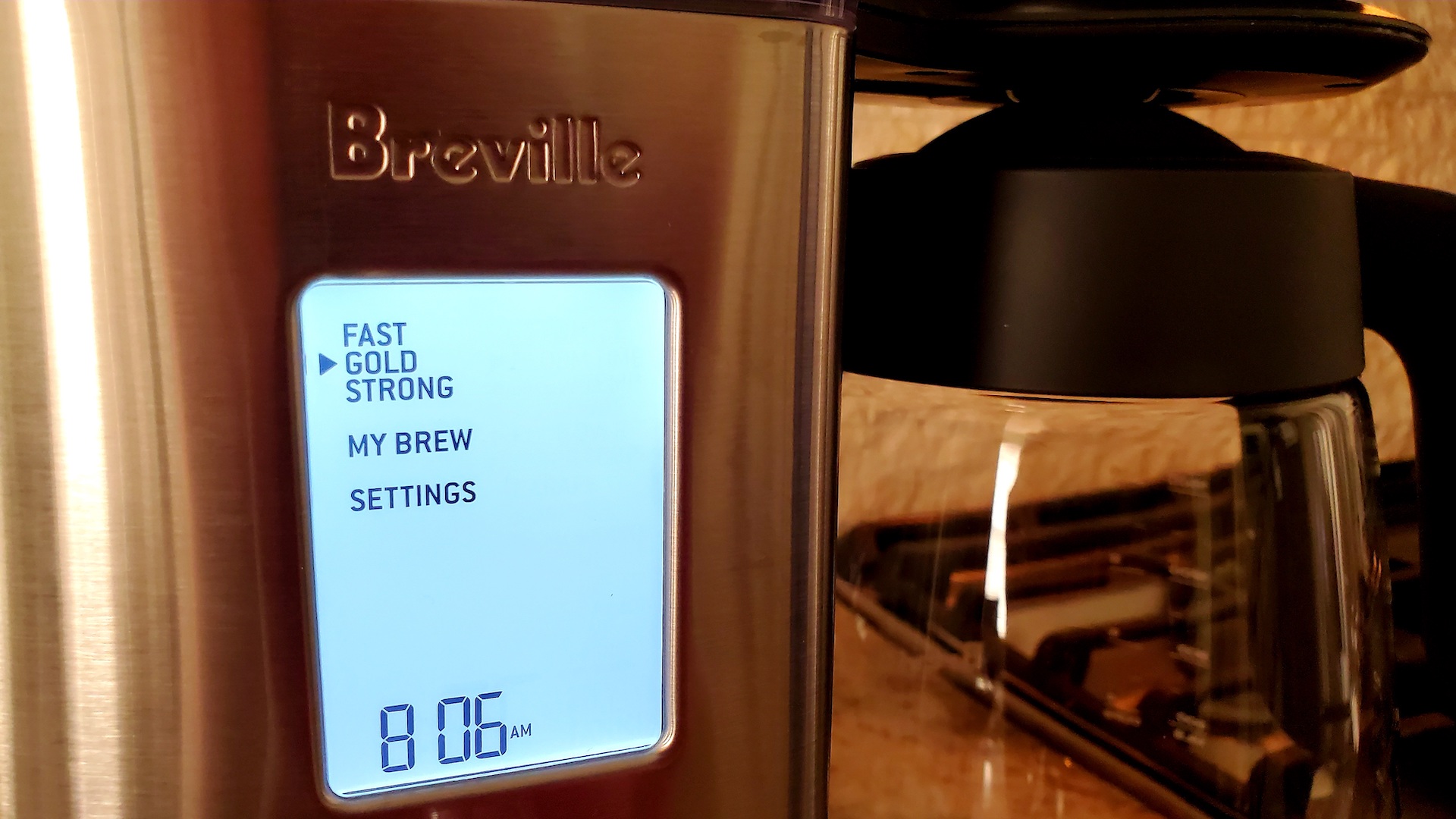
Other notable features of the Breville Precision Brewer include an automatic start (so you can wake up to a fresh pot of coffee) plus a child-safe lock (in case your little ones become curious).
The Breville Precision Brewer is a lot, even for those who are well-versed in the science of coffee. Admittedly, it took me about a week to figure out how everything worked. Fortunately, Breville includes a couple of quick start pamphlets in addition to a full instruction manual to ease users in.
Breville Precision Brewer: Design
The Breville Precision Brewer measures approximately 12 x 7 x 16 inches. Like the Ninja Hot and Cold Brewed System – which is roughly the same size – the Breville brewer will best suit medium-to-large kitchens.
Design-wise, the Breville Precision Brewer is reminiscent of the Technivorm Moccamaster KBGV Select with the heating element and water reservoir on the left. and the brew basket and spray arm on the right. However, the Breville has a more traditional aesthetic compared to the industrial style of the Moccamaster.
The Breville brewer has a control panel that consists of a 3-inch LCD, a dial, and a couple of buttons: start/cancel and auto start. Unlike the more simplistic Braun Brew Sense, the display on the Breville is large, backlit, and easy to read. It even shows how much time has elapsed since your coffee was brewed so you're aware of how fresh your next cup will (or won't) be.
The 60-oz water reservoir is attached to the coffee machine, but there is a tank lid that lifts right off. I found it a bit cumbersome to bring the Breville Precision Brewer to a tethered water source as it's not exactly feather-light, but the fully-removable lid makes it a less burdensome process.
Also included are a glass carafe with a locking lid, a permanent basket filter, and a 10-pack of paper basket filters. You'll need to be conscious of finding a place for these extras for when they're not in use.
Breville Precision Brewer: Ease of Use
The Breville Precision Brewer took me some getting used to due to its plethora of features. However, if you're one who likes to experiment with your coffee, getting acquainted with the Breville brewer may be an enjoyable process for you.
Setup involves testing the water's hardness (via an included paper test strip) and flushing the reservoir. Despite following the instructions to a tee, the machine didn't completely flush the water from the tank into the carafe during my setup, leaving about 20-oz of liquid behind. I looked for a possible cause behind this, and even reached out to Breville customer support – but to no avail. (Fortunately, it hasn't happened again.)
Operating the Breville Precision Brewer is straightforward. The instructions and quick-start guides do a fine job of explaining the ins-and-outs. The most time-consuming thing about it is – once again – its wide range of settings. However, once I learned what everything was, it became a less overwhelming ordeal.
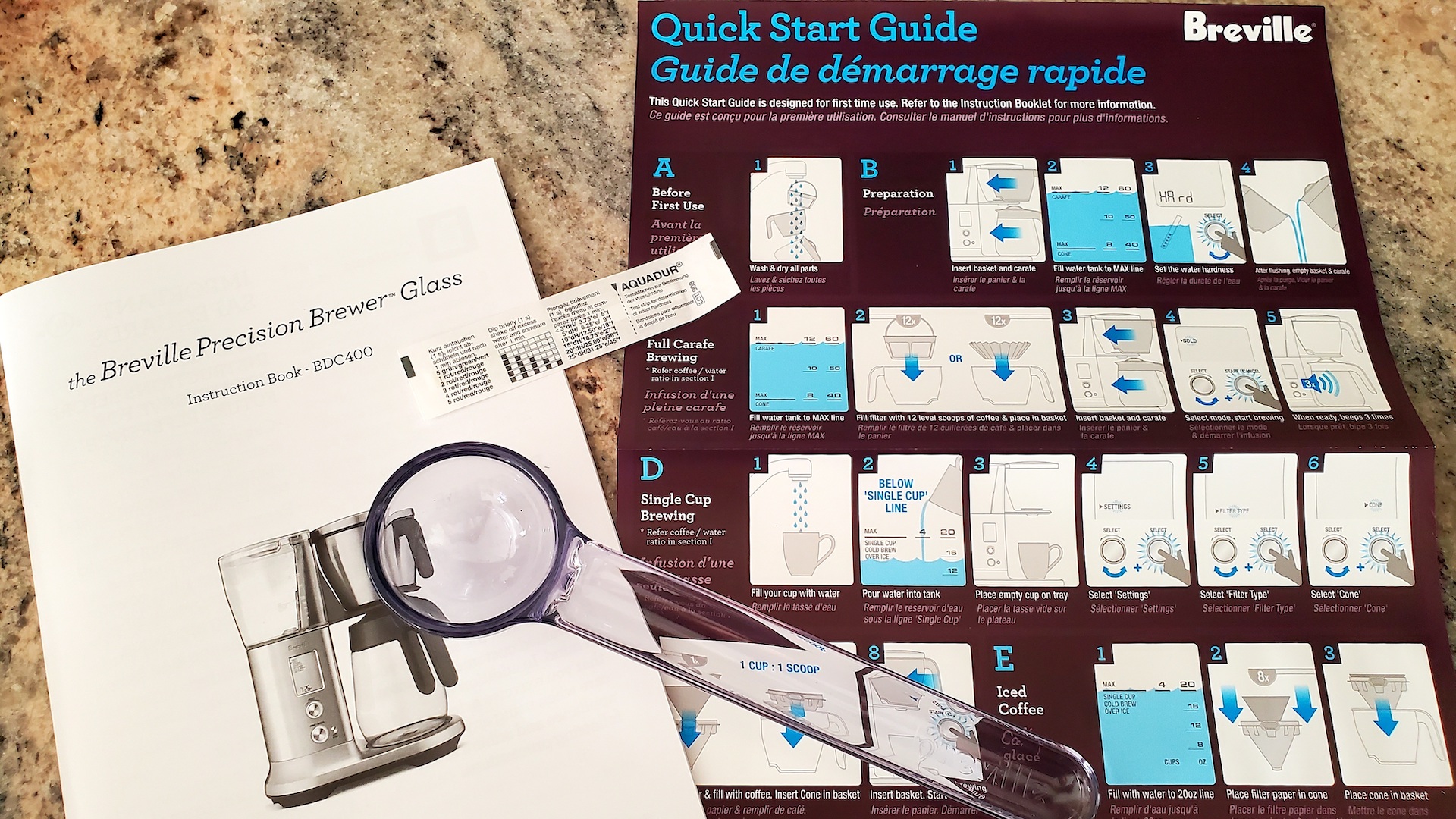
Brew times vary by preset. On the Gold setting, the Breville made four cups of coffee in about five minutes; that dropped to around three minutes and 40 seconds in Fast mode for the same amount. (Note that everything was timed from the start of the brewing process to the final drop of coffee to hit the carafe.) The Technivorm Moccamaster Select KBGV Select is still the quickest machine I've seen thus far, brewing 40 oz of coffee in under six minutes...but the Breville isn't too far behind.
Breville recommends washing the plastic brew basket, mesh basket filter, and glass carafe with warm, soapy water. The outer housing itself can be cleaned with a soft, damp cloth. The showerhead can be detached and wiped down, if necessary. The LCD will flash 'Descale' when the machine is ridden with calcium buildup and needs to be cleaned.
Once the brewing process is complete, the Breville will emit a short series of beeps. However, those beeps may not be necessary as the relative silence that follows will be proof enough that your coffee is ready, as this machine is very loud.
Breville Precision Brewer: Performance
Overall, the Breville Precision Brewer lives up to its name. It's consistent in delivering a delicious, balanced cup of coffee – regardless of setting. I used paper filters (or the permanent basket filter), spring water, and freshly-ground coffee.
The Gold preset produced a balanced cup of coffee, whether it was a fruity-and-floral Ethiopia Nano Genji or a richer dark chocolate blend. Fast mode may have been quicker to brew but it did not negatively impact the quality of the coffee.
Strong and Over Ice are similar in that each mode serves up a bolder, more concentrated cup. Speaking of Over Ice, I was pleasantly surprised with the smoothness of Breville's iced coffee. It does take extra time to prepare as it needs to cool to room temperature before serving – but it's well worth the wait.
Although I miss the immediacy of Ninja's 10-minute cold brew, I still anticipated waking up to a 10-hour cold brew with the Breville, although in the future I may elect to expand the brewing process to at least 12 hours for even smoother coffee.
Playing around with My Brew mode was fascinating, as there were so many variables that I didn't know where to begin. Ultimately, I settled on changing the brewing temperature to 180 degrees F for my dark chocolate roast – and I was very pleased with the results. However, I am one for convenience so I was more inclined to rely on the default settings than create my own.
What We Didn't Like
The Breville Precision Brewer is one noisy appliance. From the moment the start button is pushed, this coffee maker makes it known it's hard at work with a steady, jarring buzz that lasts until the water tank is completely empty. It wasn't the most pleasant sound to wake up to on mornings I had used the auto start feature, but at least it was effective in getting me out of bed.
Whenever I remove the carafe from the brewer, a drop or two of coffee seems to fall from the showerhead without fail. I'm not sure if this is a user error, although the drip stop lever that sits between the carafe lid and the showerhead doesn't seem to be obviously compromised. I just don't like having to keep wiping the hot plate.
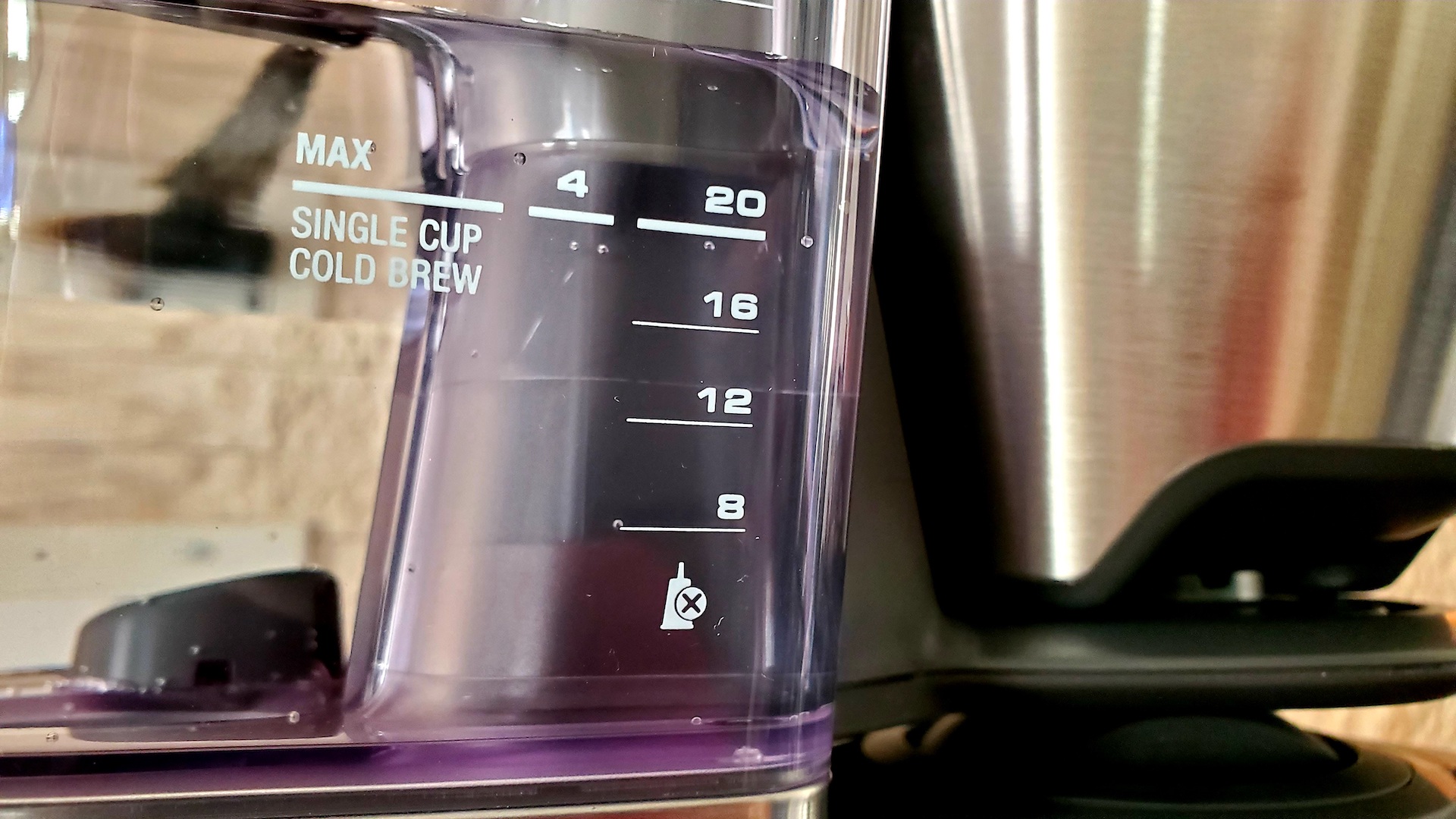
This is a relatively minor quibble, but as someone who only really makes enough coffee for 1-2 people I have to ask: why is there no cone filter included – either mesh or paper? This point may be moot as I already had plenty of cone paper filters on hand, but that may not be the case for someone else who has similar drinking habits or is buying their very first proper coffee maker. It's an odd omission.
Should You Buy the Breville Precision Brewer?
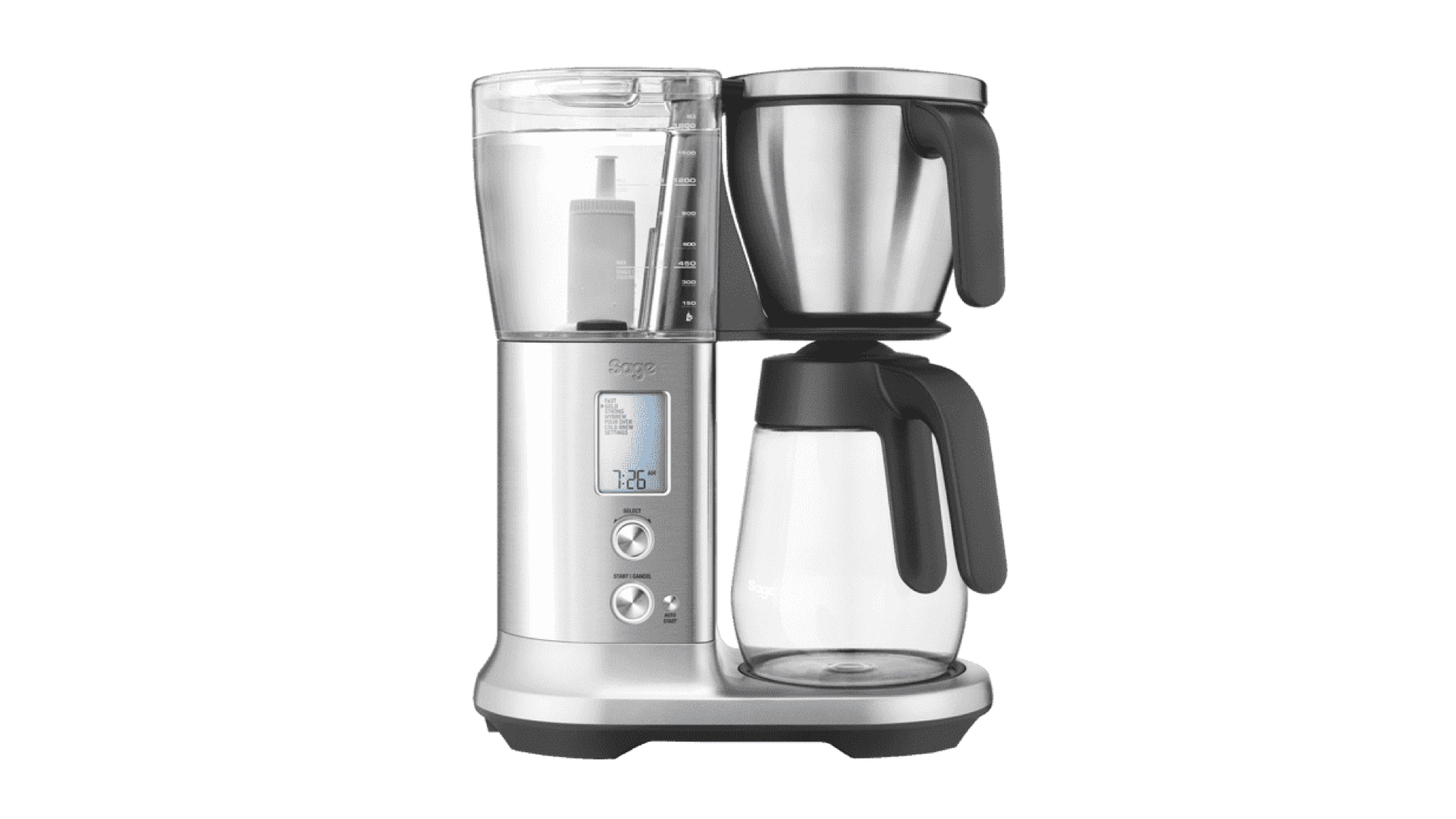
If you think of coffee as a science, the Breville Precision Brewer will make the perfect chemistry kit. With the ability to customize everything from bloom time to water flow, it'd be impossible to not eventually stumble upon that winning combination of variables that culminates in your ideal cup of coffee.
However, should you be like yours truly and prefer a suitable shortcut, the Breville Precision Brewer also offers up a series of presets for Golden Cup-standard coffee, exceptional cold brew, and iced coffee that's anything but weak and watered-down.
While the Breville Precision Brewer may not be as expensive as the Technivorm Moccamaster KBGV Select, it's still not a budget machine. But if you frequent coffee shops daily, you could eventually save money in the long run by opting to make your own drinks at home with the Breville – and thanks to its plethora of customization settings, your coffee will be just the way you want it, every time.
If you crave variety in your brewing options but find the Breville to be too expensive and/or overwhelming, the Ninja Specialty Coffee Maker is a more everyday-friendly alternative at almost $100 less. It lacks a cold brew function, though.
One thing all coffee machines have in common is that they produce better tasting coffee with freshly-ground beans. If you don't have a way to grind beans at home, peep our list of the best coffee grinders. Meanwhile, take a look at the best Cuisinart coffee makers, or check out the best espresso machines if you want to turn your kitchen into a cafe.

Based in Philadelphia, USA, freelance writer and editor Alison Barretta has been sharing buying advice and retail news for over 15 years. Since 2020 she's been helping Tom's Guide expand its robust library of sleep content by researching the latest trends, speaking with renowned experts, and going behind the scenes at Saatva, Casper, Sleep Number, Tempur-Pedic, and 3Z Brands. Alison has reviewed everything from budget memory foam mattresses and luxurious innerspring beds to immersive sound pods and $7,000 smart beds that automatically adjust to your every move. When she isn't reviewing mattresses or searching for great deals to save you money, Alison can be found practicing yoga and martial arts, experimenting with recipes, getting too invested in the Philadelphia Flyers, and snoozing with her cat / assistant mattress tester Alex.
